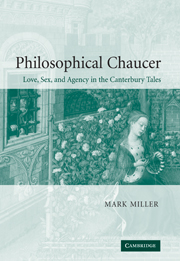Book contents
- Frontmatter
- Contents
- Acknowledgments
- Introduction: Chaucer and the problem of normativity
- Chapter 1 Naturalism and its discontents in the Miller's Tale
- Chapter 2 Normative longing in the Knight's Tale
- Chapter 3 Agency and dialectic in the Consolation of Philosophy
- Chapter 4 Sadomasochism and utopia in the Roman de la Rose
- Chapter 5 Suffering love in the Wife of Bath's Prologue and Tale
- Chapter 6 Love's promise: the Clerk's Tale and the scandal of the unconditional
- Notes
- Bibliography
- Index
Chapter 3 - Agency and dialectic in the Consolation of Philosophy
Published online by Cambridge University Press: 22 September 2009
- Frontmatter
- Contents
- Acknowledgments
- Introduction: Chaucer and the problem of normativity
- Chapter 1 Naturalism and its discontents in the Miller's Tale
- Chapter 2 Normative longing in the Knight's Tale
- Chapter 3 Agency and dialectic in the Consolation of Philosophy
- Chapter 4 Sadomasochism and utopia in the Roman de la Rose
- Chapter 5 Suffering love in the Wife of Bath's Prologue and Tale
- Chapter 6 Love's promise: the Clerk's Tale and the scandal of the unconditional
- Notes
- Bibliography
- Index
Summary
Despite Chaucer's deep engagement with the Consolation of Philosophy throughout his poetic career, virtually no major study of the Canterbury Tales in the last fifteen years has had much to say about Boethius. The reason for this widespread exhaustion or boredom with Boethius is that the underlying critical terms for understanding Chaucer's relation to the Consolation have remained unchanged for quite some time. There are, of course, important disagreements within this broadly shared set of terms. Opinion runs from the view that the Consolation is the source for a set of core philosophical doctrines which Chaucer illustrates in his poetry, to the view that Boethius stands for a philosophically and politically dangerous idealism that Chaucer subjects to a searching critique; there is also a moderate position according to which Chaucer is in many ways committed to Boethian ideals, but nonetheless reveals their limitations by placing them against a rich panoply of competing desires, beliefs, and other commitments. Underlying these disagreements, however, is a shared belief that what centrally matters about the Consolation is a set of philosophical doctrines or positions that can be independently summarized in clear propositional form, and that can therefore become in a straightforward way the objects of a propositional attitude, whether belief or qualified assent or outright rejection.
- Type
- Chapter
- Information
- Philosophical ChaucerLove, Sex, and Agency in the Canterbury Tales, pp. 111 - 151Publisher: Cambridge University PressPrint publication year: 2005

